2018 Saltire Literary Awards shortlist unveiled at special event in Edinburgh
We are thrilled to announce our Saltire Literary Award Shortlists for 2018.
Multi-award winning writers and household names Irvine Welsh, Sally Magnusson and Jackie Kay feature alongside emerging talents Mick Kitson and Christina Neuwirth in the shortlists for the 2018 Saltire Literary awards, unveiled today (22nd October).
The shortlists for six literary awards and two publishing awards were officially announced at an event hosted at the West End branch of Waterstones in Edinburgh.
And here they are:
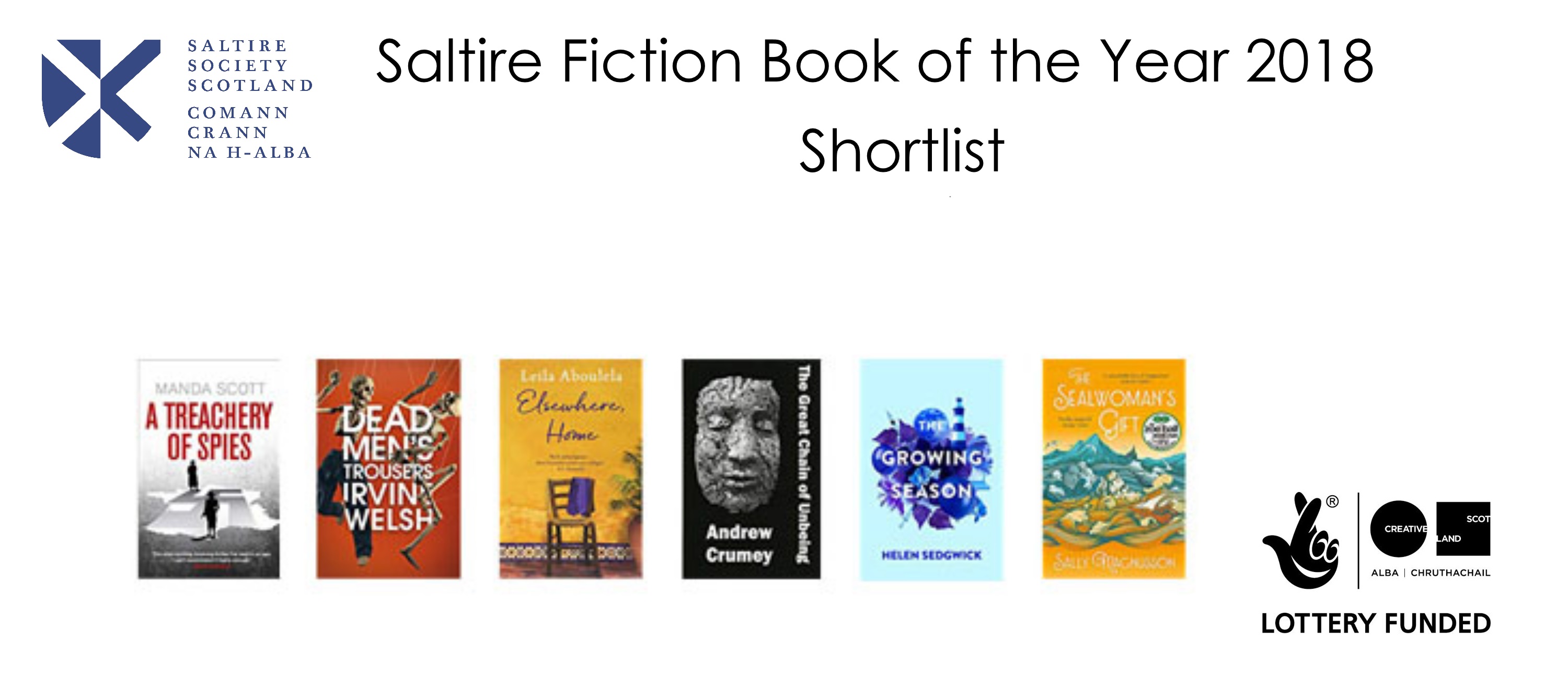
• Manda Scott, A Treachery of Spies, (Transworld Publishers). An elderly woman is found murdered in Orleans, France. She has been killed in the manner of traitors to the Resistance in World War Two. Tracking down her murderer leads police inspector Inès Picaut back to 1940s France to untangle a web of treachery and intrigue from the murder victim's youth.
• Irvine Welsh, Dead Men's Trousers, (Jonathan Cape). Fast and furious, scabrously funny and weirdly moving, this is the spectacular return of the crew from Trainspotting. Lurching from crisis to crisis, the four men circle each other, driven by their personal histories and addictions, confused, angry. One of these four will not survive to the end of this book. Which one is wearing Dead Men’s Trousers?
• Leila Aboulela, Elsewhere, Home, (Saqi Books). A collection of short stories that draws the reader into the lives of immigrants at home and abroad as they forge new identities and reshape old ones. Elsewhere, Home explores, with subtlety and restraint, the profound feelings of yearning, loss and alienation that come with leaving one’s homeland in pursuit of a different life.
• Helen Sedgwick, The Growing Season, (Harvill Secker). Anyone can have a baby thanks to FullLife's safe and affordable healthcare plan. Without the biotech baby pouch, Eva might not have been born. And yet she has sacrificed her career and her relationship, campaigning against the pouch. Now she must search for the sinister truth behind FullLife’s closed doors.
• Andrew Crumey, The Great Chain of Unbeing (Dedalus Limited). This collection of short stories ranges across time, from the Renaissance to a globally-warmed future, across light-years in search of hallucinogenic space-plankton, and into magical worlds of talking insects and bottled fire. Are they all part of some larger untold story?
• Sally Magnusson, The Sealwoman's Gift, (Two Roads). In 1627 Barbary pirates raided the coast of Iceland and abducted some 400 of its people. Among the captives sold into slavery in Algiers were a pastor, his wife and their three children. Magnusson gives a voice to Ásta, the pastor's wife, enslaved in an alien culture, she meets the loss of both her freedom and her children with the one thing she has brought from home: the stories in her head.
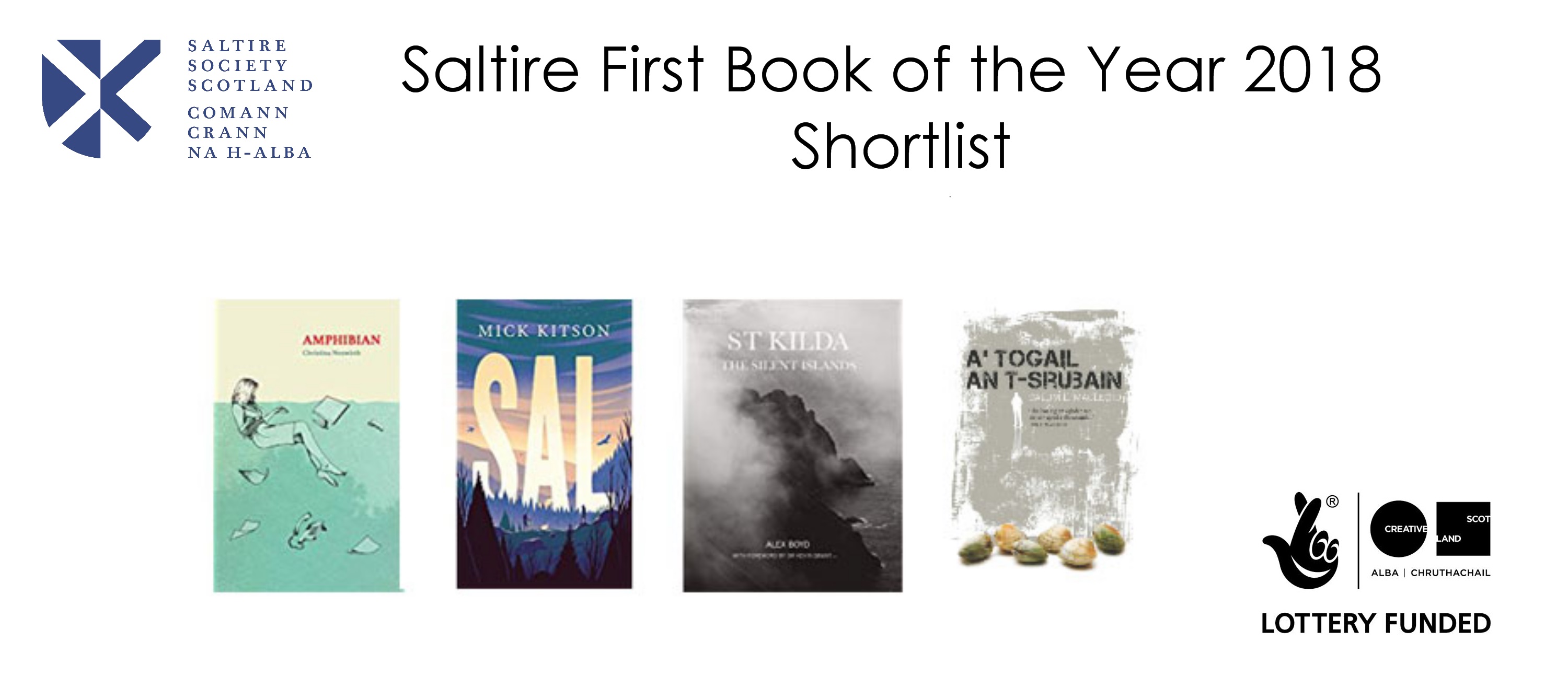
• Christina Neuwirth, Amphibian, (Speculative Books). Shortlisted for the Novella Award 2016, Amphibian tells the tale of Rose Ellis who arrives at work one morning to find that the entire fourth floor has been flooded with water, in a desperate attempt to improve productivity. As the water steadily rises, her working situation becomes more and more absurd.
• Mick Kitson, Sal, (Canongate Books). Kitson’s debut novel has earnt him the accolade of being named a ‘New Face of Fiction 2018” by The Observer. It is a heartwarming story about the end of childhood, the strength of a sister’s love and the power of nature to heal even the deepest wounds.
• Alex Boyd, St Kilda: The Silent Islands, (Luath Press). In this photography book, landscape and documentary photographer Boyd captures the reality of St Kilda in a series of photographs. His focus encompasses not only the ruinous vestiges of the indigenous St Kildans, but also the presence of the Ministry of Defence today and its impact on this wilderness landscape.
• Calum L. MacLeòid, A' Togail an t-Srùbain, (CLÀR). David's in trouble. After earning a bit of money picking cockles on the island, his life is turned upside down when he discovers a body amongst the seaweed... a body that has disappeared when David comes around after fainting. MacLeod's first novel is a psychological thriller that asks deep questions about culture and community.
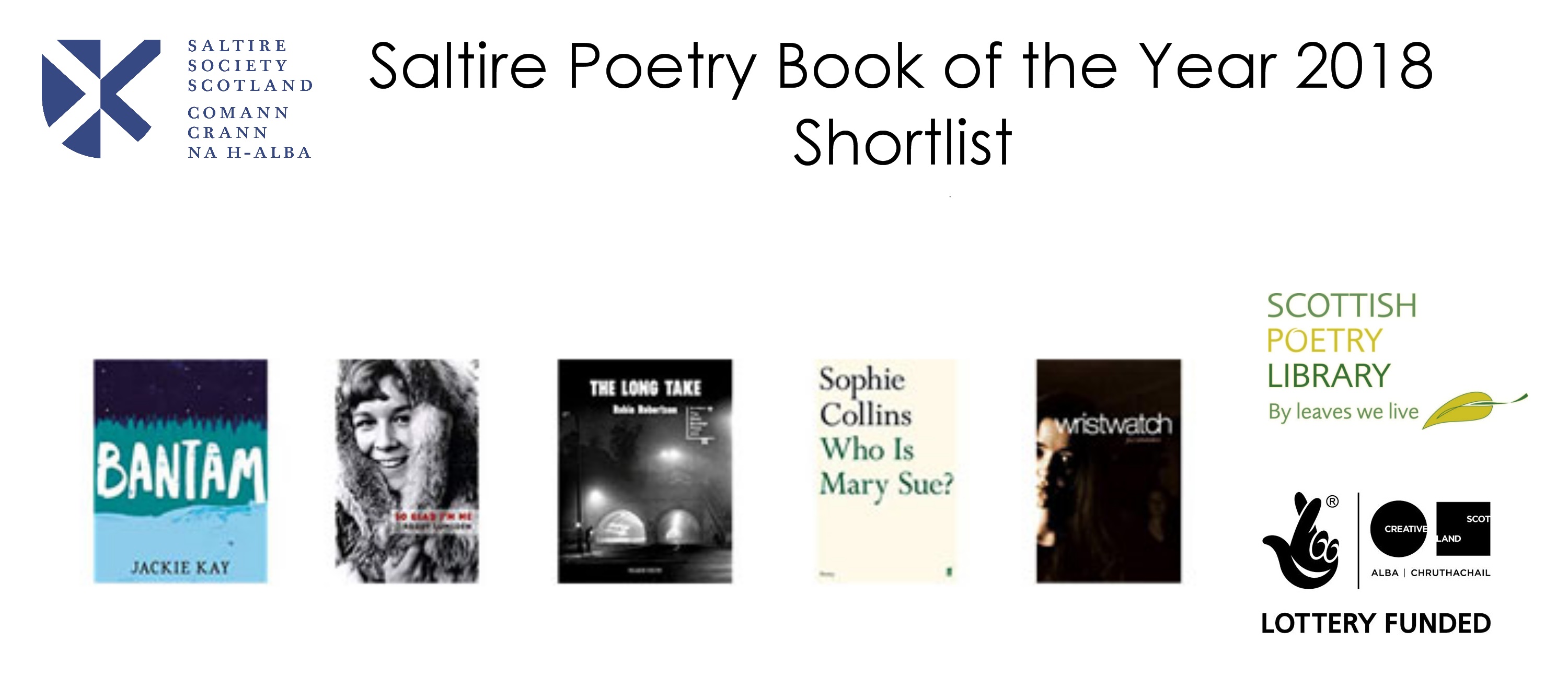
• Jackie Kay, Bantam, (Pan Macmillan – Picador). This book brings three generations into sharp focus – Kay’s own, her father’s, and his own father’s – to show us how the body holds its own story. Kay shows how old injuries can emerge years later; how we bear and absorb loss; how we celebrate new life; and how we embody our times, whether we want to or not.
• Roddy Lumsden, So Glad I'm Me, (Bloodaxe Books). Lumsden’s tenth collection contains many 'conflation poems' about songs and musicians, ranging from cult artists like Alex Chilton to big names like Elvis. He relishes unusual words and interesting, taut forms, alongside a new strand of discursive pieces in the spirit of Chicagoan poets Albert Goldbarth and Marianne Boruch.
• Robin Robertson, The Long Take, (Pan Macmillan – Picador). This genre-defying work follows a D-Day veteran with post-traumatic stress disorder as he goes in search of freedom and repair in post-war America. While he tries to piece his life together, America is beginning to come apart: deeply paranoid, riven by social and racial division, and spiralling corruption.
• Sophie Collins, Who is Mary Sue?, (Faber and Faber). In a series of verse and prose collages, Collins exposes the presumptive politics behind writing and readership: the idea that men invent while women reflect; that men write of the world outside while women turn to the interior. This book is a handbook for those willing to reimagine prescriptive notions of identity and selfhood.
• Jay Whittaker, Wristwatch, (Cinnamon Press). Written from personal experience, Wristwatch charts a course through cancer treatment and recovery, becoming a widow at 44 and taking on the social care system on behalf of elderly relatives. United by themes of transition and transformation, the beautifully realised sequences are moving, spare and convincing.
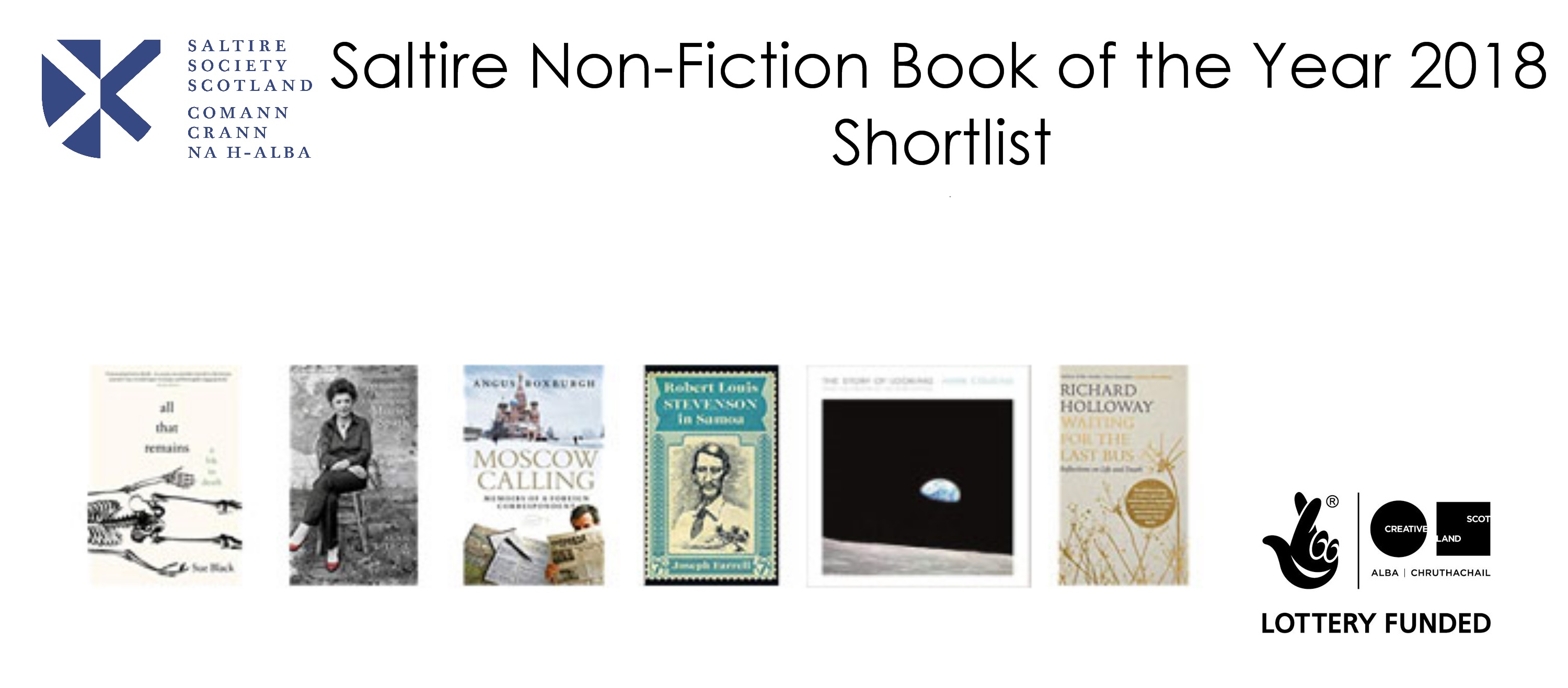
• Professor Sue Black, All That Remains: A Life in Death, (Transworld Publishers). As Professor of Anatomy and Forensic Anthropology, Black encounters mortal remains in her lab, at burial sites, at murder scenes and when investigating mass fatalities due to war or natural disaster. Here she reveals the many faces of death she has experienced and uses key cases to explore how forensic science has developed.
• Alan Taylor, Appointment in Arezzo, (Polygon). Published to celebrate the 100th anniversary of Muriel Spark’s birth, this memoir reveals her as she really was. With sources such as notebooks kept by Taylor from his encounters with Muriel and the hundreds of letters they exchanged over the years, this is an invaluable portrait of one of Edinburgh’s premiere novelists.
• Angus Roxburgh, Moscow Calling, (Birlinn Ltd). In this book Roxburgh presents his Russia, a quirky, exasperating, beautiful, tumultuous world that in four decades has changed completely, and yet in some ways not at all. From his time as a correspondent covering the Soviet Union's collapse to his work as a media consultant to Putin's Kremlin, his memoir offers a unique insight.
• Joseph Farrell, Robert Louis Stevenson in Samoa, (MacLehose Press). Few know that Robert Louis Stevenson lived out his last years on Upolu, an island in Samoa. He was given a Samoan name and became a fierce critic of the interference by Germany, Britain and the U.S.A. in Samoan affairs. Farrell's study stands apart from previous biographies by giving as much weight to Samoa as to the life and work of Stevenson himself.
• Mark Cousins, The Story of Looking, (Canongate Books). This book takes its readers on a tour in words and images through how our looking selves develop over the course of a lifetime and the ways that looking has changed through the centuries. From great works of art to tourist photographs, cityscapes to cinema, propaganda and refusals to look, it illuminates how we construct as well as receive the things we see.
• Richard Holloway, Waiting for the Last Bus, (Canongate Books). Former Bishop of Edinburgh Richard Holloway has spent a lifetime at the bedsides of the dying, guiding countless men and women towards peaceful deaths. In Waiting for the Last Bus, he presents a positive, meditative and profound exploration of the many important lessons we can learn from death.
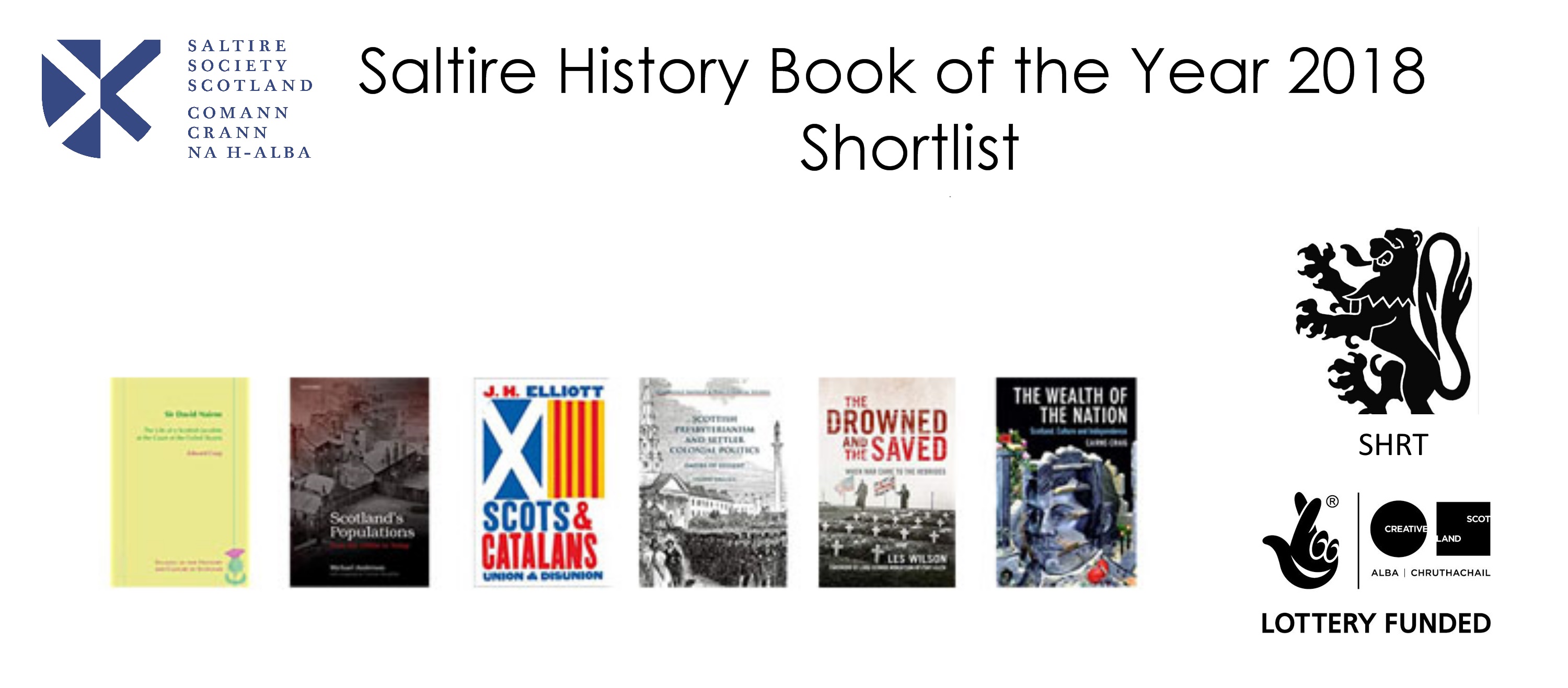
• Edward Corp, Sir David Nairne. The Life of a Scottish Jacobite at the Court of the Exiled Stuarts, (Peter Lang Ltd). David Nairne was actively involved in the administration of Jacobite politics, yet his name is not well known to most historians. This biography aims to restore him to the prominent position he occupied at the time. The chance survival of many of his papers made it possible for Corp to reconstruct a full account of Nairne’s life.
• Michael Anderson, Scotland's Populations from the 1850s to Today, (Oxford University Press). A comprehensive and well-balanced analysis of Scottish population history from 1850 to the present day. In this book Anderson contextualises regional patterns of migration, fertility and mortality, and sets current and recent population changes in their long-term context.
• JH Elliott, Scots & Catalans, (Yale). This first sustained comparative study uncovers the similarities and the contrasts between the Scottish and Catalan experiences across a five-hundred-year period, beginning with the royal marriages that brought about union with their more powerful neighbors and following the story through the centuries until today’s dramatic events.
• Valerie Wallace, Scottish Presbyterianism and Settler Colonial Politics: Empire of Dissent, (Palgrave Macmillan). This book offers a new interpretation of political reform in the settler colonies of Britain’s empire in the early nineteenth century and examines the influence of Scottish Presbyterian dissenting churches. It re-evaluates five notorious Scottish reformers, weaving their stories together and demonstrating how the campaigns they led came to be intertwined.
• Les Wilson, The Drowned and the Saved, (Birlinn Ltd). In 1918, two ships carrying American soldiers were sunk off the coast of Islay. Based on the personal recollection of survivors and rescuers, newspaper reports and original research, Wilson paints a vivid picture which also pays tribute to the bravery of the islanders who risked their lives pulling men from the sea, caring for survivors and burying the dead.
• Cairns Craig, The Wealth of the Nation: Scotland, Culture and Independence, (Edinburgh University Press). In this study, Craig analyses how Scottish culture defined itself within the British Empire and how it recovered from the collapse of the Empire to rebuild the value of its cultural past. Craig also explores the influence that modern Scottish writers and artists have had on contemporary Scottish nationalism.
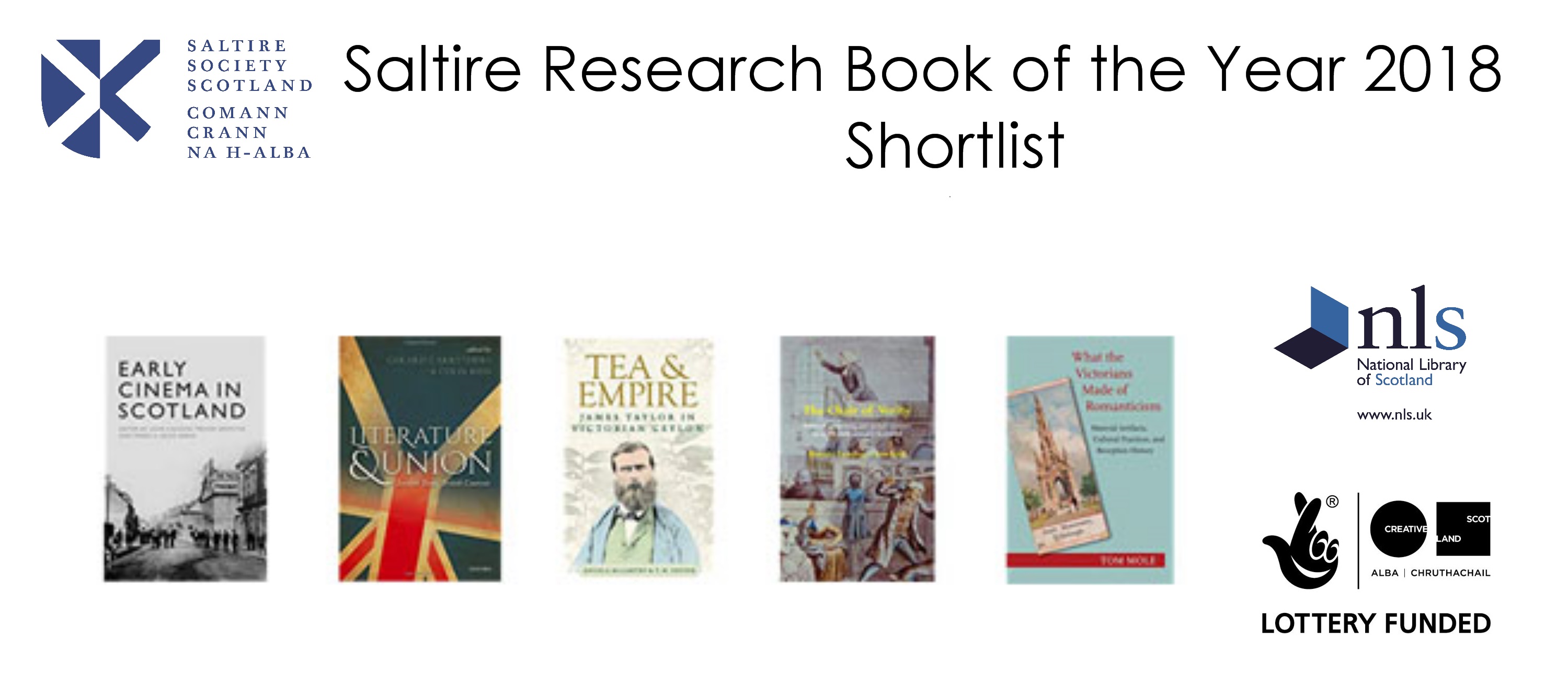
• John Caughie, Trevor Griffiths and María A. Vélez-Serna, Early Cinema in Scotland, (Edinburgh University Press). Focusing on the social experience of cinema and cinema-going, this collection of essays explore early cinema in Scotland, from its inception in 1896 until the arrival of sound in the early 1930s. It also examines the attempts to establish a feature film production sector and the significance of an imaginary version of Scotland in international cinema.
• Gerard Carruthers and Colin Kidd, Literature and Union: Scottish Texts, British Contexts, (Oxford University Press). An original study of ideas of union within the Scottish literary tradition from the early modern period to the present. With new readings of canonical Scottish and English literature, this book features some of today's leading literary scholars and historians of Britain and re-examines historic assumptions about national identity.
• Angela McCarthy and Sir Tom Devine, Tea and Empire: James Taylor in Victorian Ceylon, (Manchester University Press). This book brings to life for the first time the remarkable story of James Taylor, 'father of the Ceylon tea enterprise' in the nineteenth century. Publicly celebrated in Sri Lanka for his efforts in transforming the country's economy and shaping the world's drinking habits, Taylor died in disgrace and remains unknown in his native Scotland.
• Ronald Lyndsay Crawford, The Chair of Verity : Political preaching and pulpit censure in eighteenth-century Scotland (Humming Earth). This book is the first major study of the phenomenon of political preaching in Scotland during the age of Enlightenment.
• Tom Mole, What the Victorians Made of Romanticism: Material Artifacts, Cultural Practices, and Reception History, (Princeton University Press). This book examines how the popular media of the Victorian era sustained and transformed the reputations of Romantic writers. Mole provides a new reception history of renowned Romantic writers and attends to the material artifacts and cultural practices that remediated writers amid shifting understandings of history, memory, and media.
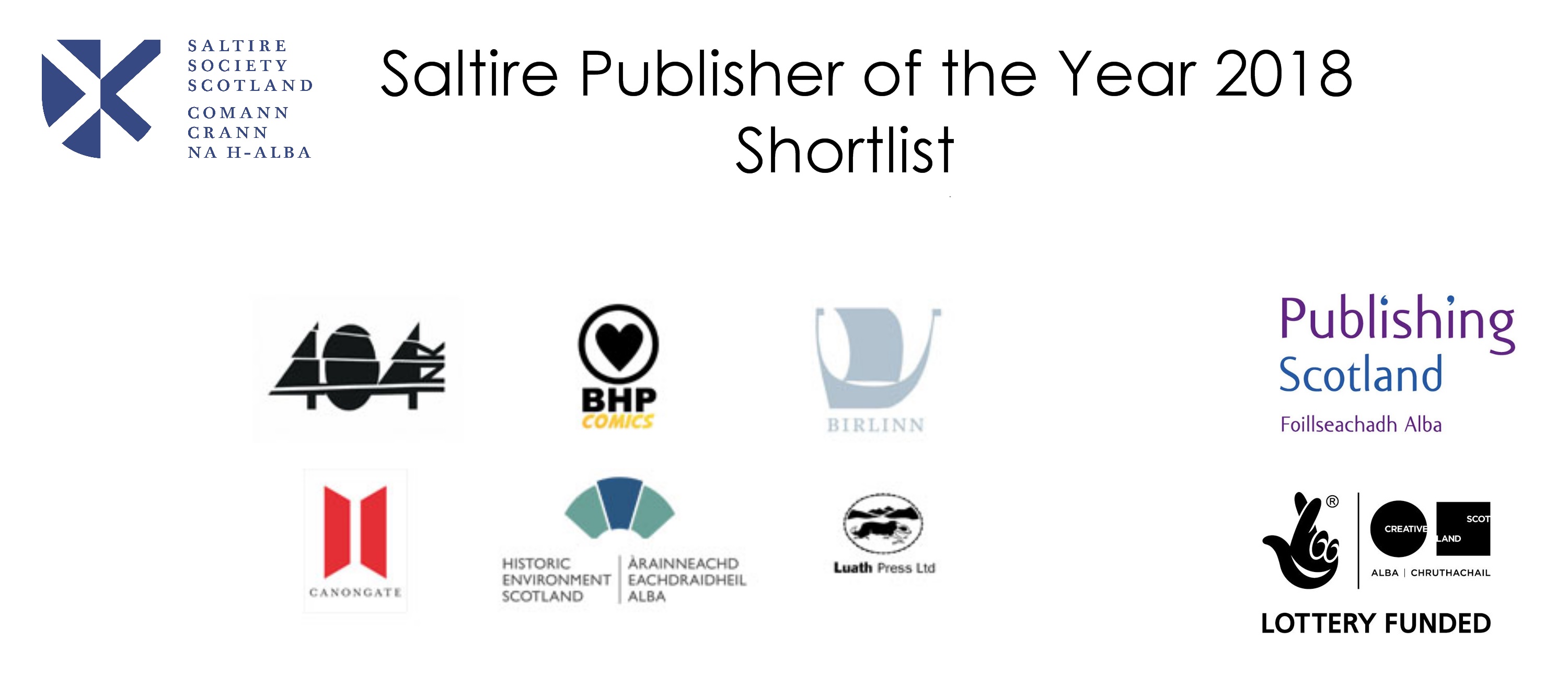
• 404 Ink. Shortlisted in the Saltire Publisher of the Year Award category in 2017, 404 Ink is an award-winning alternative, independent publisher of books and literary magazines. 404 Ink believe in publishing little but publishing loud, putting full energy and resources into every author they publish.
• BHP Comics. BHP Comics is Scotland’s leading comics and graphic novel publisher and was shortlisted in the Saltire Publisher of the Year Award category in 2017. It champions new, exciting and diverse creator-owned, comics, graphic novels and art books that cover a wide range of topics and themes.
• Birlinn Limited. In addition to celebrating its 25th anniversary in 2017, Birlinn was named winner of the Saltire Publisher of the Year Award the same year. Birlinn publishes Scottish and general UK interest books, from biography to history, and Scottish Gaelic. It aims to push the boundaries of the imagination, constantly challenging and nurturing the talent of its authors and of its team.
• Canongate Books. Established in 1973, Canongate Books has emerged as one of the most dynamic publishing houses in Britain. With an international outlook, it continues to nurture and publish new talent from around the world, whilst retaining the essence of the Scottish Canon. It was shortlisted in the Saltire Publisher of the Year Award category in 2017.
• Historic Environment Scotland. Historic Environment Scotland (HES) is the lead public body for Scotland's historic environment. From landmark works of expert research to creative collaborations with internationally renowned authors, its aim is to explore ideas and start conversations about the past, present and future of our Scotland’s history and heritage.
• Luath Press. Established in 1981, Luath Press is a leading independent book publisher with over 400 books in print including modern fiction, history, politics, travel guides and poetry. It is committed to publishing well written books worth reading and offers distinctive writing with a hint of unexpected pleasures.
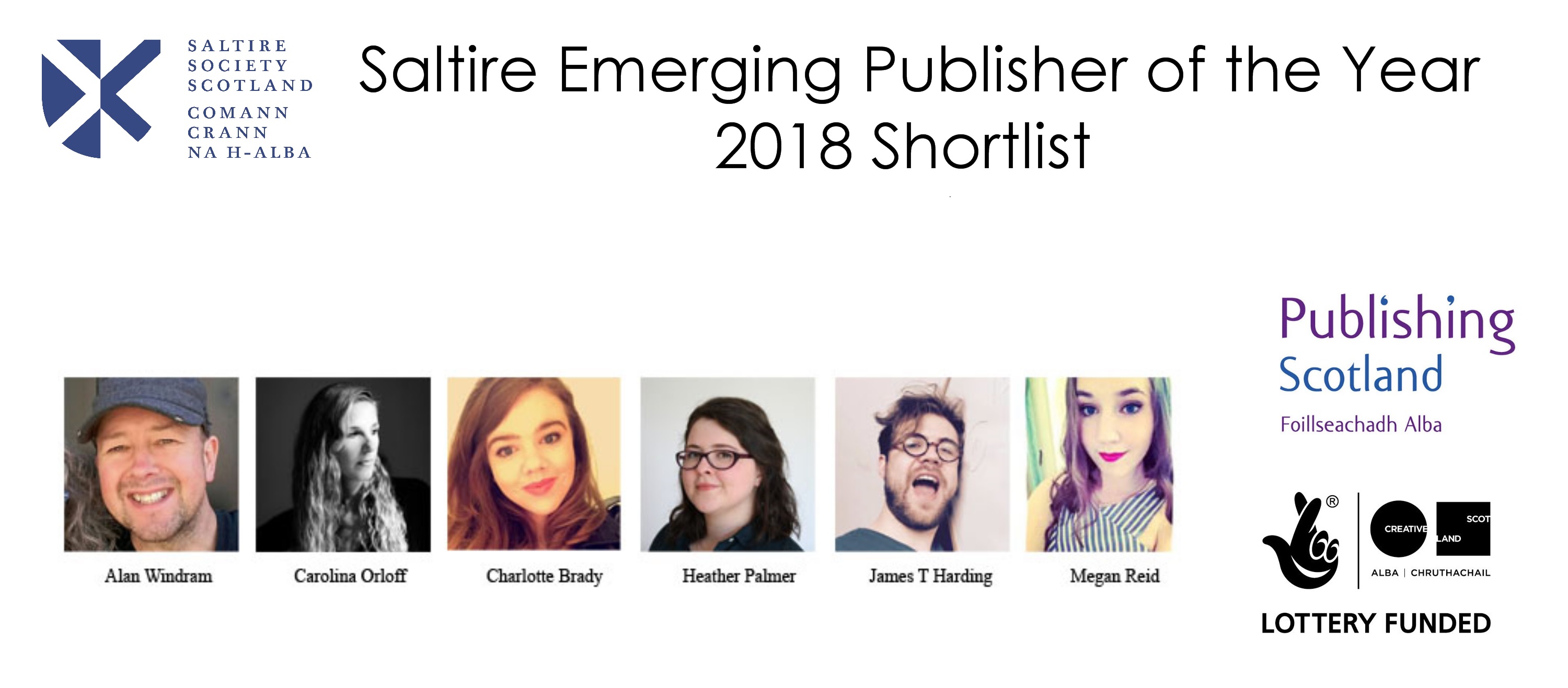
• Alan Windram (Little Door Books)
• Carolina Orloff (Charco Press)
• Charlotte Brady (Canongate Books)
• Heather Palmer (BHP Comics)
• James T. Harding (Stewed Rhubarb Press)
• Megan Reid (Canongate Books)